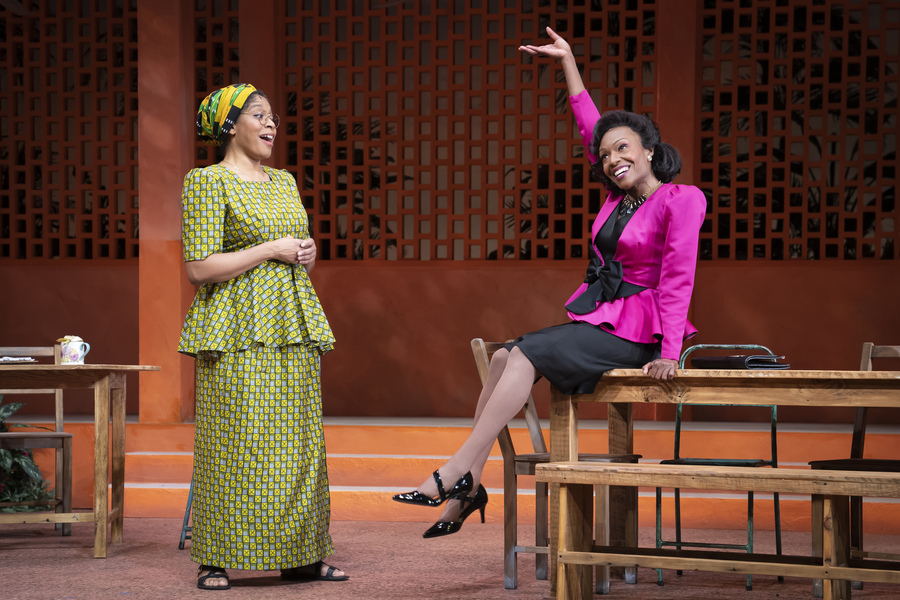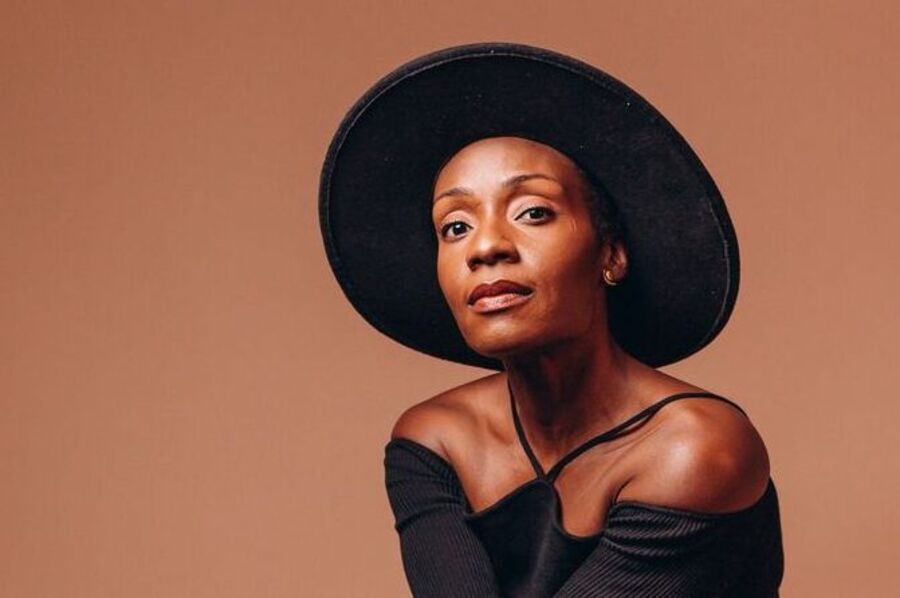Lanise Antoine Shelley wasn’t really looking for an artistic director position when she was approached about the opening at the House Theatre of Chicago. Shelley (she/her) had momentum going in her acting and directing career, working throughout Chicago’s largest theatres as an actor and director and acting in such Chicago-staple television shows as Empire, Chicago Fire, and Chicago Med. Two months ago she even had her first full-length play, Pretended, read as part of The Inception Project, a new-works initiative from Paramount Theatre in Aurora, Ill. But when House company member Erica Ratcliffe approached Shelley about the search for a new leader and encouraged Shelley to toss her hat into the ring, she decided to follow “the intuitive ping” and see what happened next.
“Next” turned out to be Shelley joining not only the House leadership but a movement in Chicago and across the country of hiring Black, Indigenous, and people of color (BIPOC) theatremakers to lead historically or primarily white companies. The House, which was founded in 2001 by playwright and director Nathan Allen, calls itself “Chicago’s premier home for intimate, original works of epic story and stagecraft.” But as Allen noted in an Aug. 19 statement on the theatre’s website, the theatre had fallen short of its mission and was facing “renewed criticism for being racist, culturally insensitive, and demeaning” in the content and execution of the House’s 2005 production of Allen’s Curse of the Crying Heart.
In a recent interview, Shelley acknowledged that, historically, the House has been a primarily white company where only a few people have been able to rise to the top. As part of her early days as leader of the company, Shelley has been having one-on-one conversations with the theatre’s members, discussing the future of the company. It’s part of her goal, she told me in an interview, to turn the House into a multicultural hub. But to create this change as a BIPOC leader, she said, will take the support of her community. “This is what we marched for last summer,” said Shelley. “Here we have it. It means a lot to have the community behind us, flanking us, holding us close, and willing us to succeed, because that is what’s going to create indelible changes. That kind of support.”
Last week, a year after the Goodman production of School Girls; Or, the African Mean Girls Play she was in closed due to the pandemic, Shelley talked to me about her vision for the future of the House Theatre of Chicago and what it’s going to take to make it happen.
JERALD RAYMOND PIERCE: You’ve worked at pretty much every major house in Chicago. So I’m curious how you landed with the House Theatre of Chicago as your artistic home moving forward?
LANISE ANTOINE SHELELY: This whole last year was a year of deep uncertainty. I think everyone started to take psychic inventory and figure out, What’s next for me as an artist? I was definitely asking those questions and just taking whatever breadcrumbs were laid before me and seeing where they lead.
So I decided to follow this one, and at each juncture of the hiring process, I did my investigation of the House and realized how much I had in common with it, having been brought up with Wooster Group and Anne Bogart and a highly physicalized understanding of theatre and appreciation for theatre, and spending 10 years with Lookingglass Theatre as a teaching artist and an actor. I have an appreciation for what the House stands for in their playfulness and in their discovery. We are both fluent in that kind of language.
As the months went by and the rigorous process started to come to an end, I started to get excited about the idea of actually being able to have a platform where I can create opportunities for other artists. This was an opportunity where I can merge those worlds of helping out other artists and bringing their visions to fruition but also bringing my own vision for this theatre that I have so much in common with to a new dawn of exploration.
As you talk about your vision and working with the artists, how are you balancing this new responsibility with your acting career and other credits? Correct me if I’m wrong, but it looks like Goodman is planning on continuing with their production of School Girls; Or, the African Mean Girls Play, in which you were playing Eloise before the pandemic closed the production.
To be honest, I don’t quite know how that balancing act will happen. The board knows that I still want to pursue acting and directing outside of the House, because I think it’s imperative that I continue to learn and grow as an artist and then bring that back into my experience with the House. It can only enrich everything that I do by working externally. During the hiring process, I let them know that there were a few things already on my docket that were non-negotiables, and that was one of them. I am committed to being in School Girls—that is a project that means a lot to me, and they were excited by that. They really embraced the idea that I continue my art outside of the House and then bring that knowledge back in.

Looking at the big picture in regards to your new role, are there certain goals you have going in?
I am committed to the diversification of programming, because it has historically been cis white male-driven narratives. I am passionate about shifting that paradigm and creating programming that reflects the Chicago city at large and reflects the nation. I have a very global perspective, having studied in six different countries and worked all over the place. My entryway for art is varied and vast, therefore my work will be informed by all of that. My programming will be informed by my global experience.
So that’s a goal that I have for the House long term, but there are still things that I need to learn as well. Right now, I am learning about the culture of the House. I’m doing one-on-ones with the company members right now, and there’s 52 of them. There’s a lot to take in, learning about what has worked and what hasn’t, and distilling what sets it apart from any other theatre in Chicago. What theatrical experience is unlike anything anyone else has experienced? I’m distilling those things down and seeing if I can package them in a way that feels true to me.
For those outside of Chicago, who may not be as familiar with the city’s theatre landscape, can you tell me how you see the House uniquely fitting into the local scene?
Well, I want the House to become a destination for [all] artists to create. Right now it hasn’t historically been that. It’s been an insular, exclusive club where only the founders and about three different men have flourished. I want it to be a place where we know what we can provide for the community, because there are quite a few things that the House is great with when it comes to devising new works. They’re renowned for that.
So I want to create a formula of what we specialize in and then create an opportunity for other artists to come to the House, learn that formula, and eventually propagate this House mission and value system throughout Chicago. And collaborations/co-productions in Chicago and nationally will really help us grow; we haven’t been growing because the conversation has been more internal and closed off. I want to expand the conversation so that we become comparable to a Victory Gardens in the sense that Victory Gardens is the destination for playwrights. Chicago Shakes is an educational destination, Goodman is a destination for directors. We, as the House, need to figure out, why are people going to come to us and what are they going to come to us for?
Absolutely. I love that response. I completely agree. I love Chicago theatre because everybody does seem to have that specialty you can rely on them for. Zooming out a bit, a lot of the conversation over the last year has been around this movement toward racial equality and the demands issued by We See You, White American Theatre. Can you talk to me a little bit about what, if any, changes you’ve seen in theatre, and specifically Chicago theatre, over the last year in terms of trying to redress the field’s inequities?
Right now I feel that the changes I’ve observed have been cosmetic. We have yet to see the implementation of these changes, because we haven’t been in these theatres yet. All we’ve been seeing are websites with Black Lives Matter and solidarity hashtags and things like that. But when it comes to working in these spaces, have things changed then? That is my biggest question: How does it feel when you’re actually in that space?
We are seeing an influx of female BIPOC leaders coming up, which is awesome. Now what I would like to see is how these communities rise up to support us so that it isn’t a cosmetic change, so that it’s not superficial, it’s long-lasting, it’s indelible, and it’s a trickle-down effect that reverberates in the boards that are pulling the strings. When we see evidence in the companies that some of these BIPOC leaders inherit such as myself, and we see it in their programming, their casting, and their artistic teams—that is when we’ll know that true inclusivity has arrived. But until that moment, I think everyone’s just kind of watching and waiting and learning and seeing how deep these commitments go.
Have these kinds of conversations been part of what you’ve been talking to the company members about as you get to know them?
Absolutely. I launched a survey for what I call my “listening tour” that I’m on and they all filled out the survey before they spoke with me. They’ve really clarified their feelings around the House, around being a company member, the culture of the House, how they witnessed diversity or didn’t witness it. So they already know that this conversation is being had, it’s important to me, we’ll continue this dialogue, and that the change is coming. One of the questions that I charged them with the first time I met the company on Zoom was, “What are you willing to let go of?” That really rocked a few people.
Those are such important, but also such difficult conversations to have. The House has been around for 20 years. So when you’re trying to make changes, there will have to be some compromises along the way.
Exactly. And a lot of them are rejoicing at the possibility of change. Those who had benefited from the old regime, it’s going to be a little stickier for them. But this is the consequence of progress.
Jerald Raymond Pierce (he/him) is associate editor of American Theatre. jpierce@tcg.org


